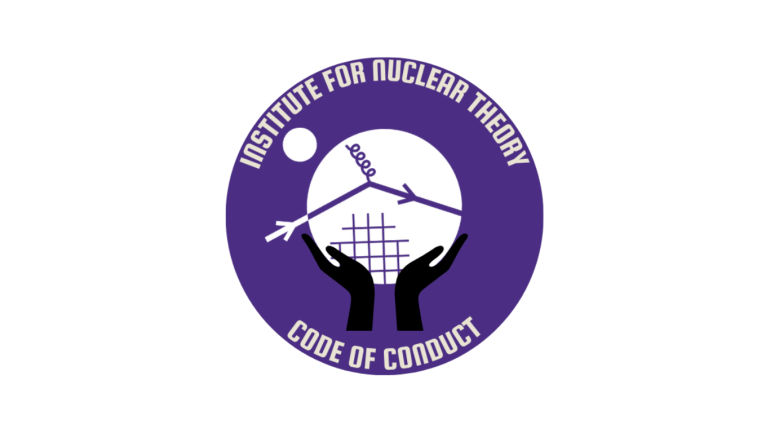
Creating an inclusive and supportive environment for scientific discourse and research is paramount to the INT mission. INT personnel1 and visitors are expected to:
- Conduct themselves professionally and treat all individuals at the INT and INT-hosted events in a manner that is respectful and free from all forms of discrimination2, harassment3, bullying4, and defamation5.
- Carry out their scientific research with integrity (shall not commit scientific misconduct, defined as fabrication, falsification, or plagiarism), respect intellectual property and adopt fair research practices, assign credit appropriately to other researchers, correct errors in their work when detected, and maintain confidentiality when required.
- Adhere, in addition, to their employers’ codes of conduct.
If you experience or witness behavior that violates the INT code of conduct, please report it promptly. INT visitors can report violations to:
- Program/workshop organizers
- INT administrator Kimberlee Choe
- Designated program coordinator, or
- INT senior faculty
Another way to report suspected violations is by submitting an INT Code of Conduct Incident Report. When submitting an incident report you will have the option of keeping your identity anonymous.
We will take immediate actions to address the situation. The INT administrator and program coordinators have received training to understand the issues and have demonstrated their ability to respond effectively.
Further, the INT Faculty and the INT program organizers are encouraged to intervene when witnessing violations of the INT code of conduct and acknowledge that failure to do so normalizes inappropriate behavior. All verbal and written communication will be treated confidentially or restricted on a need-to-know basis. Sanctions may range from a verbal warning to ejection from the INT and notifying authorities. We will not tolerate retaliation for complaints of misconduct.
The University of Washington offers the following resources:
- Safe Campus: https://www.washington.edu/safecampus/
- UW Bias Reporting: https://www.washington.edu/bias/
If you have been subject to or witnessed behavior and actions that you consider criminal/illegal, please report it to the Seattle Police Department, then to the INT Director.
1INT personnel includes senior fellows, research assistant professors, postdocs, staff, and students.
2Discrimination is defined as prejudicial treatment of individuals or groups of people based on individual characteristics such as sex, race, ethnicity, sexual orientation, gender identity, gender expression, marital status, nationality, political affiliation, ability status, educational background, age or any other characteristic protected by law.
3Harassment includes sexual harassment, harassment based on gender, and any verbal or physical behavior directed at individuals or groups of people because of their race, ethnicity, color, national origin, sexual orientation, gender identity, age, religion, disability, veteran status, or any other characteristic protected by applicable laws, that creates an intimidating, hostile, or offensive environment. Sexual harassment is unwelcome sexual advances, requests for sexual favors, and other verbal or physical conduct of a sexual nature that creates an intimidating or offensive environment.
4Bullying is unwelcome, aggressive behavior involving influence, threat, intimidation, or coercion to dominate others professionally.
5Defamation is a statement (written or spoken) that injures a third party's reputation. It includes a false statement purporting to be fact and the publication or communication of that statement to a third person.
